
THE VOICE OF INTERNATIONAL LITHUANIA
|
VilNews has its own Google archive! Type a word in the above search box to find any article.
You can also follow us on Facebook. We have two different pages. Click to open and join.
|
Featured black
- Posted by - Comments (0)
 |
FROM NOVEMBER 2006 THE STATE’S EDUCATION IN A BAD SHAPE |




- Bookmark :
- Digg
- del.icio.us
- Stumbleupon
- Redit it
- Posted by - Comments (0)
Are you of Lithuanian descent, living abroad?
Tell us about your skills
in Lithuanian language

Darja Lyzenko
By Darja Lyzenko, SIC
darja.lyzenko@sic.lt
Together with Vilnius University our research company is currently carrying out a research study about the language skills and usage of Lithuanian descent people residing outside of Lithuania. We are looking for Lithuanians who (1) currently live somewhere other than Lithuania for more than 3 years, also (2) who left Lithuania either by themselves or with their parents, or (3) whose parents or grandparents left Lithuania before they were born, i.e. who were born outside of Lithuania.
- Bookmark :
- Digg
- del.icio.us
- Stumbleupon
- Redit it
- Posted by - Comments (0)
Are you of Lithuanian descent, living abroad?
Tell us about your skills
in Lithuanian language

Darja Lyzenko
By Darja Lyzenko, SIC
darja.lyzenko@sic.lt
Together with Vilnius University our research company is currently carrying out a research study about the language skills and usage of Lithuanian descent people residing outside of Lithuania. We are looking for Lithuanians who (1) currently live somewhere other than Lithuania for more than 3 years, also (2) who left Lithuania either by themselves or with their parents, or (3) whose parents or grandparents left Lithuania before they were born, i.e. who were born outside of Lithuania.
The survey is conducted via internet all over the world. We would therefore appreciate any help in spreading the information about this study. In case you have your community forum/Facebook account or send newsletters to the community members - we have prepared a flyer (see below) with short text information about the survey in both - English and Lithuanian. We are also kindly inviting you personally to register and participate in the survey.
Darja Lyzenko
Tel: +370 5 2054 524 Fax: +370 5 2054 501
Greenhall, Upės g. 21, LT-08128 Vilnius
www.sic.lt
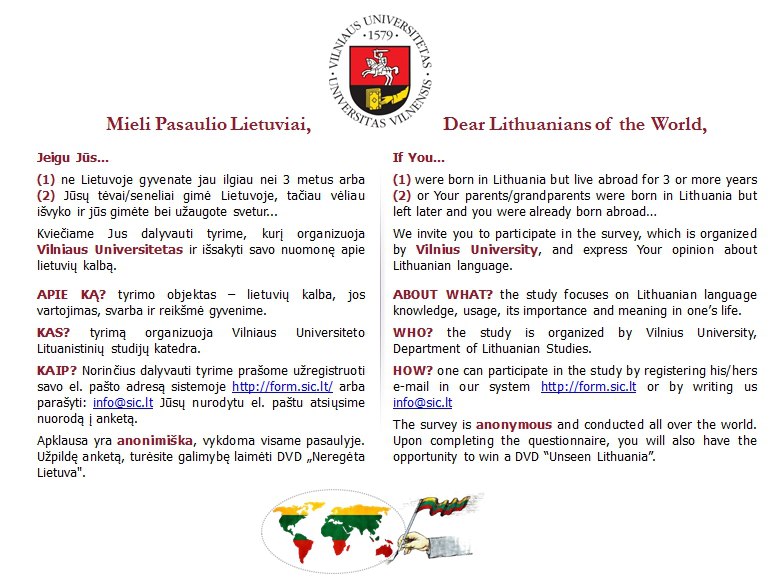
- Bookmark :
- Digg
- del.icio.us
- Stumbleupon
- Redit it
- Posted by - Comments (0)
News from Baltic
educational institutions

Baltic Management Development Association (BMDA) offers all Baltic Institutions to present news in their monthly newsletter. The newsletter includes information about international BMDA network news and events that is placed in interactive BMDA IT portal www.bmda.net
If you would like to have news about you and your institution in BMDA Newsletter, all you have to do, is place the news in BMDA IT portal.
- Bookmark :
- Digg
- del.icio.us
- Stumbleupon
- Redit it
- Posted by - Comments (0)
 |
VilNews section 4: |
FROM OUR ARCHIVES
Welcome to some of our highlights from the last 10 years!
Articles, interviews, comment articles and more…

- Bookmark :
- Digg
- del.icio.us
- Stumbleupon
- Redit it
- Posted by - Comments (0)
In focus today: VilNews Section 17
Good news, bad news for Lithuania's economy in the nearest future
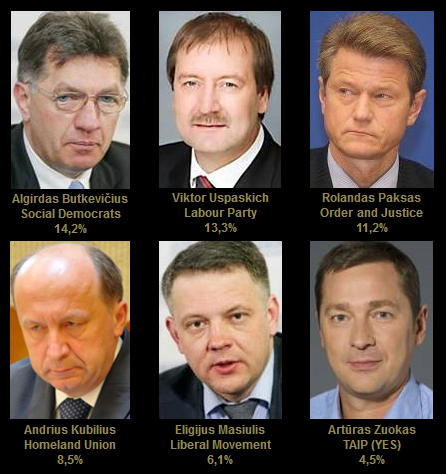
A main risk is related to the economic policy path that will be chosen by
the new government after the parliamentary election* on 14 October, where
the six political parties / leaders over are likely to gain support as shown
according to a poll from June on the website www.delfi.lt
Swedbank is out with a new ‘Economic Outlook’. These are some of their forecasts for Lithuania in 2012 – 2014:
• A main domestic risk is related to the economic policy path that will be chosen by
the new government after the parliament election on 14 October.
• Annual growth has bottomed out and will pick up slightly in the second half of this
year.
• Lowered forecast for 2013 by 0.2 percentage point to 4.1%, mainly due to the
bleaker outlook in the euro area, which will be a drag on Lithuanian exports.
• Lithuanian economy to return to close to potential only in 2014, when GDP will
expand by 4.5%.
• Slightly higher inflation next year, mainly due to an increase in regulated prices.
• Unemployment forecast estimated to 13.2% for 2012, 11.5% for 2013 and 9.3%
for 2014.
• Domestic demand has in 2012 been supported by non-labour income –
pensions
were increased by 9.3% – and this effect will ebb next year.
• The monopoly Lithuanian Gas has decided (and the regulator has agreed) to
increase gas prices for households by about 22%...
- Bookmark :
- Digg
- del.icio.us
- Stumbleupon
- Redit it
- Posted by - Comments (0)
Good news, bad news for Lithuania's economy in the nearest future

A main risk is related to the economic policy path that will be chosen by
the new government after the parliamentary election* on 14 October, where
the six political parties / leaders over are likely to gain support as shown
according to a poll from June on the website www.delfi.lt
Swedbank is out with a new ‘Economic Outlook’. These are some of their forecasts for Lithuania in 2012 – 2014:
- A main domestic risk is related to the economic policy path that will be chosen by the new government after the parliament election on 14 October.
- Annual growth has bottomed out and will pick up slightly in the second half of this year.
- Lowered forecast for 2013 by 0.2 percentage point to 4.1%, mainly due to the bleaker outlook in the euro area, which will be a drag on Lithuanian exports.
- Lithuanian economy to return to close to potential only in 2014, when GDP will expand by 4.5%.
- Slightly higher inflation next year, mainly due to an increase in regulated prices.
- Unemployment forecast estimated to 13.2% for 2012, 11.5% for 2013 and 9.3% for 2014.
- Domestic demand has in 2012 been supported by non-labour income – pensions were increased by 9.3% – and this effect will ebb next year.
- The monopoly Lithuanian Gas has decided (and the regulator has agreed) to increase gas prices for households by about 22% as of July 1 this year. This decision was due to higher oil prices (the import price of gas is directly indexed to the price of oil); however, this increase now seems excessive, considering the steep decline of oil prices during the past few months. Our estimates show that this will add about 0.35 percentage point to annual inflation. The price of heating in some major cities will go up in the second half of 2012, and public transport will become more expensive.
- Although it is still possible that Lithuania will meet the price stability and budget deficit Maastricht criteria in the spring of 2013, the prospects of adopting the euro in 2014 are dim because the government has not yet designated this as an official national target.
- The budget deficit will decline further in 2013 and 2014, to 2% and 1% of GDP, respectively.
- Tax revenues as a share of domestic demand (and GDP) have disappointed somewhat and remain close to 15%, well below the pre-crisis average of 18.3%. The government has implemented a number or reforms aimed at reducing tax evasion and the size of the shadow economy, but so far these have brought limited success.
- The Nielsen “empty-pack” survey shows that in the second quarter the share of smuggled cigarettes dropped to 29.3%, down from 34.6% a year ago and a stunning 43.0% from the end of 2010. The measures taken thus far – the rotation of customs officers, taxation of goods once a person has crossed the eastern border more than five times, implementation of cashiers in covered markets – all these represent a positive progress towards a more transparent economy but have not solved the large-scale corruption and smuggling problem. The continuation of these reforms should remain the priority of the new government.
To read the full Swedbank report, go to: http://www.swedbank.lt/lt/previews/get/3199/1345536465_Swedbank_Economic_Outlook_(August_2012).pdf
* Parliamentary elections will be held in Lithuania on 14 October 2012, alongside a referendum on the construction of the new nuclear power plant. All 141 seats in the Seimas are up for election. The last elections in 2008 led to a centre-right coalition government between the Homeland Union – Lithuanian Christian Democrats, National Resurrection Party, Liberal and Centre Union, and Liberal Movement. The National Resurrection Party has since merged with the Liberal and Centre Union.There will be 34 political parties participating in the elections.
- Bookmark :
- Digg
- del.icio.us
- Stumbleupon
- Redit it
- Posted by - Comments (0)
If Lithuania gets its house
in order it will become a
wonderful country

Kęstutis J. Eidukonis
1. The country is overtaxed
2. Because of these high taxes most small firms and individuals in Lithuania cheat and lie
3. One cannot hold accountable the various organs of government either
4. The lack of accountability in the government.
5. We have adapted all the bad attributes of Greece
- Bookmark :
- Digg
- del.icio.us
- Stumbleupon
- Redit it
- Posted by - Comments (0)
In the early 1990s Algirdas Brazauskas lectured the international body
of economists and management specialists that the Soviet system was
an equally good alternative to any Western market economy…
To continue the Soviet-style thinking, is to lose Lithuania as a country

Valdas Samonis
Opinion: Valdas Samonis
- Bookmark :
- Digg
- del.icio.us
- Stumbleupon
- Redit it
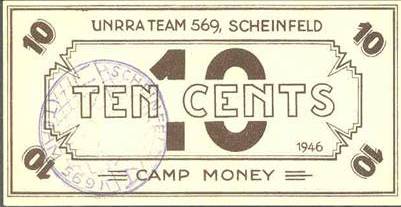
Dear readers,
We are delighted and honored that Mr. Frank Passic has graciously offered to share with us his vast knowledge of Lithuanian numismatics. In this article he provides us with a very interesting look into how Lithuanians living in Displaced Persons camps, following World War II, dealt with the situation of currency to help them survive in their daily lives.
- Bookmark :
- Digg
- del.icio.us
- Stumbleupon
- Redit it
This country is steeped in corruption
- Posted by - Comments (0)

General Director Reidar Inselseth at the Espersen Fish Factory in Klaipeda
I sit with the director of the Espersen plant in Klaipeda, Norwegian Reidar Inselseth, in the new office building his firm has just built. The building is designed as the wheelhouse of a ship, with a shiny blue glass surface, and the 'bow, roof top and masts' in stainless steel.
Reidar has been director of this facility for four years now, and among other things, been responsible for extensive new investments and developments of the company. My first question to him is what he finds hardest by being entrepreneur and company leader in Lithuania.
"The lack of predictability," he replies immediately. "Unfortunately, that is something that to a far too high degree characterizes this country. For my company this is so serious that we hardly had chosen Lithuania for our production if we eight-nine years ago had known what we now know."
"This country is steeped in corruption, which we feel very directly when we often are subjected to strange inspections etc. from the authorities; something we do not see anything like in any of the other countries where we have fish processing plants. We are, for example, constantly subjected to unreasonable disclosure requirements and controls, even if we always follow highly acclaimed and transparent international principles of production, environmental control, bookkeeping and treatment of employees. It feels as if here in Lithuania companies like ours still have to prove their innocence instead of being greeted with open arms and cooperative attitudes."
- Bookmark :
- Digg
- del.icio.us
- Stumbleupon
- Redit it
- Posted by - Comments (4)
Kestutis J. Eidukonis about Lithuania year 2012
Not all civil servants
are crooks or fools

By Kestutis J. Eidukonis, CEO VilNews
kestutis.eidukonis@VilNews.com
I have been coming and observing life in Lithuania for almost 20 years and would like to offer some observations and comments on life in Lithuania according to Lithuanians. These are little gems I have picked up talking to Lithuanian friends and relatives and my observations on these so called "TRUTHS". I don't vouch for the accuracy of these claims they may or may not be true, but perceptions are often just as corrosive as reality.
Truth according to Lithuanians:
1. It doesn't matter who is in power - nothing will change. Voting is useless - I have no one to vote for anymore. Everyone I voted for in the past has disappointed me.
Apathy is a useful tool for enemies of the country. This is a sure sign of defeat.
2. All politicians are crooks. They only go into parliament to steal money - Very common feeling. When asked to explain - most Lithuanians are able to point out which parties are financed by whom or what. Strangely enough, they will always point out one or two politicians whom the believe are honest and would do a good job "if the parties and the "real rulers" would only let them.
I don't believe ALL members of parliament are fools there are some good ones.
3. There are no honest news sources.
With the exception of LRT (Lithuanian Radio & Television - run by the government) radio PUKAS run by a reform minded patriot, ( I would like to include VilNews) most of the other media has been bought by - name a country... In reality it is hard to find anything positive about any government official in any news media. LRT at least doesn't smear people or ridicule them. Strangely enough some obviously corrupt and foreign influenced politicians are given a pass. This leads people to tune out and discount most things they hear or read. It is also believed that politicians are able to "buy" either favorable or at least neutral coverage. The Lithuanian news media is not held in high regard by most citizens.
4. The government offices are full of useless friends and relatives of politicians who do nothing but put up obstacles for "honest" citizens trying to make a living. The Lithuanian golden rule applies. In the rest of world "he who has the gold makes the rules". In Lithuania "he who makes the rules gets the gold".
My observation - not all civil servants are crooks or fools. I have met and know some good people who are dedicated and do a good job under trying circumstances.
5. The government offices are filled with ex KGB officers.
Lot of truth to this one. Why don't we just fire them?
6. The government, especially the prosecutors and judiciary is corrupt to the core. There is no justice in Lithuania. We constantly see people "getting away with it" in the news. This reinforces the "there is nothing good, there is no justice" inLithuania, school.
There has got to be some honest ones.
7. Things were better in the Soviet times. We had jobs and things got done properly.
When pressed everyone agrees that - yeah we had money but there was nothing to buy - ah but vacations were free etc. What happened to the feeling and spirit of 1989-91?
8. People are leaving Lithuanian not necessarily for economic reasons - but because they do not see a possibility of changing Lithuania for the better.
This one is very true.
As a former military "propaganda" analyst, I recognize that for propaganda to be effective the lies must be hidden by a cloak of truth. Wildly inaccurate propaganda or "disinformacija" cannot succeed, but I must admit that whoever has been conducting this campaign has succeeded beyond all expectations. They have turned the words "some" into "all" as in all politicians are corrupt.
I would like to offer some unsolicited solutions
As usual in any of my articles I also would like to offer some unsolicited solutions. My Lithuanian friends also believe that us US Lithuanians don't know or understand anything but here goes - Start with a citizens movement. Lithuanian Patriots need to come together on a number of fronts. Don't go start any more parties. The referendum process can work very well in this country but we need thousands of involved dedicated citizens to work together. Not just complain, but do something. The internet is a powerful tool.
1. Size of the Seimas needs to be cut. There was a referendum called for on this - but thanks to a lack of support it failed to garner the required signatures. It needs to be resurrected. The size of the Seimas needs to be cut and their salaries cut. The Seimas needs people who are their to do good for their country - this means sacrifice - not to enrich themselves or their friends and family. Paralysis through analysis. Remember what the Liberum Veto did to the Grand Duchy of Lithuania. Distraction through corruption and scandal. I do admit that the Seimas has also done a lot of good, but its reputation is not good.
2. Voting for political party tickets need to be abolished. Vote for individuals not parties. Now I have to elect the trash along with the "few good" candidates. Candidates can still belong to parties, but let the voter chose which individual will do a good job and if a party has good candidates they will be elected. Presently the election is used to reward friends relatives and other useful idiots. We just have to look at who is there now. We have some very good people and a lot of people who do not have what it takes. The same goes for our ministers. Some of them are in over their heads.
3. Lets expose who runs which news media. I have no problems with their opinions - but let us know who is backing them. I think some are definitely run by hostile intelligence services.
4. Government size needs to be cut. Let us use a zero based start. Every department has to justify its existence and its budget. Let us eliminate all political appointments, ex KGB officials and anyone who has been involved in any form of corruption. Lithuanian cannot support the size of the government it has now - this problem will be even worse once the EU is forced to tighten its belt.
5. Let us start a school for prosecutors preferably run by a person who is seen as totally trustworthy by society. Staff this school with the most honest teachers, staff it with the brightest, bravest and best youth we have. After graduation replace ineffective and corrupt prosecutors without mercy. The same goes for the Judiciary. Judges should come from the best and bravest prosecutors.
6. Let us also examine our Intelligence services. What do they know about who or what has infiltrated Lithuanian society. They may have legitimate reasons for not exposing these people, I would be curious to know what those reasons are. According to one very reliable source there are over 200 known "foreign agents of influence" working in Lithuania are any of them working in the Lithuanian Intelligence Service? Do our intelligence services know who they are? These people are very well financed and have gotten imbedded in the highest levels of society and government. There are forces at work who want to destroy Lithuania. These forces are well funded and brilliantly led. They have co-opted people in the media and non-governmental organizations to willingly or unwillingly do their bidding. Lithuanians deserve better, but they need to get awake and see what has happened to their country. Is this the country the Lithuanian partisans fought and died for? Is this the country people went to Siberia for? Is this the country we want for our children and grand children?
- Bookmark :
- Digg
- del.icio.us
- Stumbleupon
- Redit it
- Posted by - Comments (0)
In focus today: VilNews Section 21:
Lithuanian food
traditions since the
Grand Dukes
Prie lietuvių stalo – at the Lithuanian table
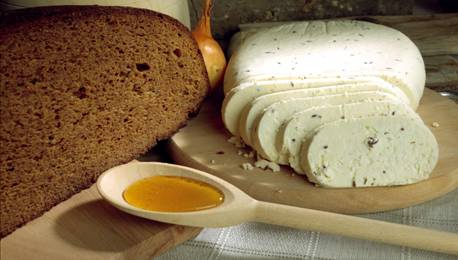
Text: Vin Karnila, Associate Editor
vin.karnial@VilNews.com
Sveiki garbingi skaitytojai,
Lithuania is steeped in traditions. It would be difficult to think of any part of daily life, family events or holidays where age old traditions are not practiced. Included in these are the time honored traditions that are practiced at the table. Yes, even sitting at the table to enjoy your meal is something that involves traditions practiced for generations by Lithuanian people all over the world.
- Bookmark :
- Digg
- del.icio.us
- Stumbleupon
- Redit it
- Posted by - Comments (0)
Lithuanian food traditions
since the Grand Dukes
Prie lietuvių stalo – at the Lithuanian table
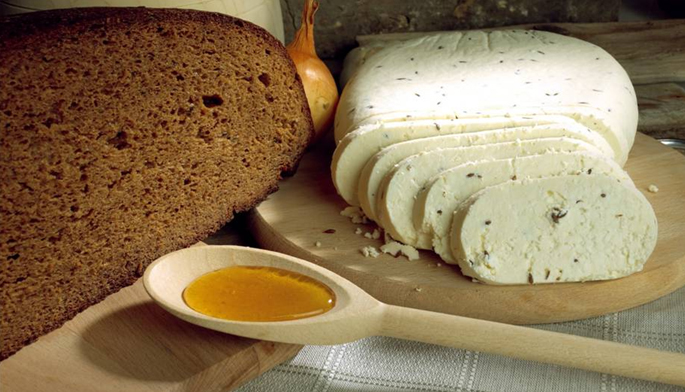
Text: Vin Karnila
Sveiki garbingi skaitytojai,
Lithuania is steeped in traditions. It would be difficult to think of any part of daily life, family events or holidays where age old traditions are not practiced. Included in these are the time honored traditions that are practiced at the table. Yes, even sitting at the table to enjoy your meal is something that involves traditions practiced for generations by Lithuanian people all over the world.
To start, there is the order of seating. The father sits at the end of the table. Now the end he sits at is important to note also. He sits at the end of the table that is near the wall not the end that faces the open room or the door. The eldest son sits at the father's right, while the other men sit next to the son along the wall. Women sit across from the men and the mother sits at the opposite end from the father. This traditional seating is maintained especially during holidays, when the entire family gathers together.
Now the question arises about the seating when the grandparents are at the table also. In this case it is customary that the father of the man of the house would take the position at the end of the table near the wall and his son (the man of the house) would then sit to his right.
Here is another tradition that I still see happening regularly. This involves an unmarried lady regardless of her age. She can be four or forty four it doesn’t matter. Very often at big get-togethers the hosts need to borrow tables, chairs and benches to accommodate all the guests. As a result the seating can be a little cramped, which is really no problem and adds to the friendship of the occasion. What happens is one of the little girls will want to sit at the table so she will squeeze her way onto the end of a bench at the corner of the table. Upon seeing this, the married ladies will throw their hands up in the air and shriek in horror. There is then a mad scramble and this confused little girl will be thrown between two of the married ladies and a married lady will take the place at the corner of the table. The by now very confused little girl will sit there with a very perplexed look on her face trying to figure out what the big problem was. It is then explained to her that if an unmarried lady sits at the corner of a table she will be cursed and never will marry. As I said, I see this happening to this day. To see the whole thing unfold can be quite entertaining.
With all the wonderful food that has been prepared, still the most important of all is the Bread. For Lithuanians bread is the most important of all food. It is a part of Lithuanian tradition and culture and is a symbol of life itself. This is why the Bread is placed in the most honorable place on the table which is right in front of father. The meal starts with the slicing of Bread by the father and this is done following tradition.
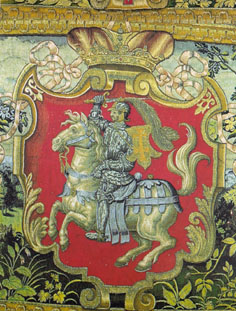
Father slices and passes the bread with great respect. The first slice, a corner of the bread is given to the eldest, married son, with wishes that his firstborn will be a son. Each member of the family takes a slice of bread directly from father's hand and places it respectfully on the table. Notice that the tradition is that the father takes the bread in his hand and places it in the hand of the others. While passing food to others at the table with your hands in some corners of social etiquette would draw gasps of table manners’ shock, for Lithuanians this is a symbol of great respect and love. The father is passing the bread, the symbol of life, from his hand to yours. I don’t mind telling you and I am not embarrassed to say that every time I sit at a table and watch this symbolic gesture take place I am almost overcome with emotion. It is truly one of the most beautiful of traditions in its symbolism.
The remaining, unsliced piece of bread remains on the table, with the cut end facing the most important corner of the house (whatever corner the family feels is the most important corner) or is facing the sun. The cut end of the bread was not placed facing the door because it was believed that this would make the bread angry. I must say that no one has ever explained to me exactly what would happen if the bread got angry about having its cut end pointed at the door but considering the importance bread plays in Lithuanian traditions and our daily lives it’s best we point it in the correct direction so we don’t find out.
This next tradition concerning bread is absolutely essential to abide by.
The bread IS NOT to be placed upside down on the table. I can guarantee that if you do this YOU WILL hear about it. The reason being is that placing bread upside down on the table is a serious desecration and for that the bread's vengeance will appear as a death in the family.
Another important tradition for the respectful handling of bread is that it is not allowed to break a slice with one hand. It takes both hands to earn bread so also it should be broken with two hands.
This tradition works great to get the kids to practice better table manners and handle their food more carefully. If you drop a piece of bread on the floor you must pick it up off the floor, kiss it and then eat it. It doesn’t matter how big or small the piece is, this tradition must be followed. Oh yes, I remember this one. This was probably the number one thing that got me to use better manners at the table.
Now one more piece of advice regarding bread at the table. How many of us have used a small piece of bread to mop up some of the remaining gravy or sauce off our plate? I openly confess to this practice and it’s a very practical and tasty way to enjoy the remaining sauce and at the same time you are helping clean the dishes. In fact one of the pleasant parts of sitting down to enjoy a wonderful Italian pasta dinner is using a piece of fresh and oh so delicious Italian bread to get every last drop of tasty tomato sauce. Growing up in a mostly Italian neighborhood I can tell you that this is common practice and is accepted and even encouraged. However when you are seated at a Lithuanian table, bread is never and I repeat NEVER used to clean up sauce off the plate. Weather you hold the bread in your hand to do it or break off a small piece and then use your fork, bread is not a tool to clean your plate and bread is not an eating utensil. The tradition is that bread is eaten from your hand and is the practice that should be followed at the table.
Should a visitor arrive when the family is at table, the visitor greets the eaters
with "skanaus" (bon appétit). If father answers "prašom" (you are welcome), it means do join us at the table. However if the answer is "ačiū" (thank you), the visitor is not invited to join in the eating. If invited to join the family at the table, a visitor from far away is either seated next to father or in his place. A “beggar” is seated at the other end of the table, near the door. Please allow me to add something to this. If you are visiting a Lithuanian family, that still follows traditions, and you are invited to sit at the father’s place, you are being paid a great honor. Be sure you thank your hosts most graciously.
Now here comes another Lithuanian tradition – The tradition of accepting or declining. When offered something you MUST at first politely decline. To accept at the first offering is considered extremely rude. The host MUST then ask offer again. For the host to not offer a second time is considered extremely rude. You should then again politely decline the second offer. The host should then offer again for a third time. After the third offer you can then graciously accept. If after the third offer you still politely decline then it is accepted that you really do not and/or can not accept the offer. Hence the tradition of asking three times.
An unexpected visitor was always graciously received and even if the family was not prepared to eat yet, food was soon set out. It usually consisted of traditional sausages, curd cheese, honey, eggs and homemade beer. To be polite, the visitor did not eat or drink until the host urged him to do so. This urging, when done immediately after the food and drink are put on the table, is a true sign of Lithuanian hospitality.
If the table is loaded with all kinds of goodies but there is no urging to partake in the food, it is said, "there was plenty of everything, but there was no urging at all from the host".
In earlier times, the host would fill his glass with beer or mead, and greet guests with these words,
"to your health dear brothers, drink and be merry. Be healthy, dear visitors". He then sprinkled a few drops on the floor so that everyone would be in good health and then drank from his glass. The spilling of a few drops of your drink is actually done as a “gift to the gods” (of drink). Refilling his glass again he would then pass it to the guest. If everyone shared the same glass, each one greeted each other with these words, "be healthy", and answered with "to your health". The glass was sent around the table from the right side because spring seeding was done with grain sprinkled to the right side, so drinks also go to that side. This tradition still continues today.
Lithuanians are known for their hospitality. They like to entertain and be entertained. Expecting guests they go all out preparing all kinds and amounts of delicacies. The hosts appreciate this statement, "there was plenty of everything, the only thing missing was bird's milk".
Guests preparing to go, thank, saying "thank you for the delicious cake, strong beer. Today we ate and drank yours, next time we'll drink mine". The host answers, "to your health".
There is another belief that the family cat, when she washes her face with her paw is telling you that guests are coming. The guests will come from the direction to which the cat is facing. Another arrival is forecast by cutlery falling on the floor, if a knife or spoon falls, a male guest is on his way, if a fork falls, expect a female guest.
So the next time you are invited to sit at the table of Lithuanians, take a moment to observe how many of these traditions are still being followed. Or – Maybe you can add some of them to your table?
- Bookmark :
- Digg
- del.icio.us
- Stumbleupon
- Redit it
Traditional Lithuanian šaltibarščiai & cepelinai
- Posted by - Comments (0)
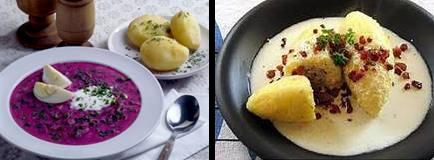
So often we hear something like this from people “I remember Sundays when I was a child. My mom would make cepelinai (potato dumplings filled with meat) and we would all gather around in the kitchen for this special meal”. Sadly what we also hear is “I have no idea how to make these traditional Lithuanian foods”.
- Bookmark :
- Digg
- del.icio.us
- Stumbleupon
- Redit it
Two Lithuanian dishes you simply have to try!
- Posted by - Comments (10)
|
|
|
So often we hear something like this from people “I remember Sundays when I was a child. My mom would make cepelinai (potato dumplings filled with meat) and we would all gather around in the kitchen for this special meal”. Sadly what we also hear is “I have no idea how to make these traditional Lithuanian foods”.
So, for those of you wanting to experience “true Lithuania” and wanting to remember the “good old days,” a few culinary musts are CEPELINAI, KUGELIS (potato pudding/cake) and ŠALTIBARŠČIAI (cold beetroot soup), accompanied of course by a glass of cold beer. Preferably Lithuanian beer.
Today we bring you the recipes for the šaltibarščiai and the cepelinai.
Now before I get into the recipes, it may be a good idea to explain why I was chosen to write this and other articles about preparing traditional Lithuanian food. I am not what you would call a great cook. With the exception of some amazing creativity with a barbecue, in the kitchen if I somehow prepare a marvelous meal it’s more a matter of luck rather than any amount of skill.
Some of the recipes may seem to be a little involved but actually they are not. All of the recipes I will give you are for meals I have prepared myself and I don’t mind one single bit telling you that they came out great!!! So the decision was made that if some one like me who needs to be supervised while in the kitchen so I don’t hurt myself can prepare these meals with success then I would be the best person to share these recipes with our dear readers. I’m sure that all of you will also meet with success when you prepare these traditional foods of Lithuania. After all, if I can do it...
ŠALTIBARŠČIAI
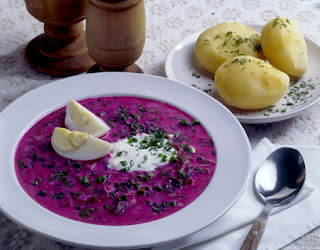
Here is what you will need:
2 good sized Beets
2 Cucumbers about 6 inches/15cm long (the smaller ones have more taste)
Sour cream
1 Liter/4 cups Sour Milk or Butter Milk
1 cup Boiled Water
8 sprigs of Fresh Dill – Finely Chopped
250 ml./1 Cup Scallion Greens or Chives - Finely Chopped
Salt and Pepper to taste
INITIAL PREPARATION:
Boil the beets for about 30 minutes.
After the beets cool enough so that they are comfortable to touch, peel off the skin.
Cut the beets into very thin strips – about 1/8 to 1/4 of an inch wide and 2 inches long. This can be a little time consuming so some people will coarsely grate them instead.
Hard boil the 2 eggs and allow to cool completely
Boil the 1 cup of water and then chill it (it should be COLD)
Finely slice the cucumbers
Crush the egg yokes
PREPARATION:
Add everything together. Add the Beets, Cucumbers, Milk, Scallion Greens/Chives, Boiled Water that is now Chilled, 100 gr./6 Tablespoons of Sour Cream, Salt and Pepper to taste and mix well.
Serve in individual bowls sprinkled with the Dill. The Egg Whites can be finely chopped and added to the mixture or you can get a little creative and finely slice them and put on the soup for decoration.
Traditionally ŠALTIBARŠČIAI is served with hot boiled potatoes as a side dish.
And don‘t forget the Lithuanian Black Bread
CEPELINAI
Recipes for traditional foods for all nationalities will all have their little “twists“ added in based on the region of the country or from one family to another. The recipes for many traditional Lithuanian foods are the same. The recipe for Cepelinai is like this. Based on what region your family is from or how your grandmother preferred to make them, you will find a difference with the amount of raw grated potatoes and boiled potatoes used.
The next question is what kind of potatoes should be used???
It’s best to use what is considered a “white” potato.
OK OK OK – now before some one says – What a moron this guy is, ALL potatoes are WHITE please allow me to elaborate :o)
As an example, don’t use Red potatoes and there is a variety called Yukon Gold which will give you an OK constancy but the color will have a strange yellow tint to it. I’ll need my friends in California to help me out on this one – Hey Sig and Rima, I understand that out on the West Coast there is a variety of potato that’s PURPLE??? Could you shed some light on this please? What works best are U.S. varieties such as Idaho and Maine potatoes. Our good friends in Canada have those wonderful P.E.I spuds and russet potatoes from your Prairie Provinces will work just fine. Here in Lithuania and Eastern Europe I honestly don’t know what the variety of potato is called here. I just use the potatoes that are not the Red potatoes (now you can maybe start to understand why I need supervision while I’m in the kitchen so I don’t hurt myself).
Here is the basic ratio for Grated to Cooked potatoes – For every pound/.5 Kg. of Potatoes use 2 average size Potatoes for the Cooked Potatoes.
POTATO PREPARATION
Peel 5 Lbs. of potatoes
Boil 8 average size potatoes
Grate the rest of the potatoes (apx. 4 Lbs.). When you grate the potatoes you need to use the side of the hand grater that has the SMALLEST holes if you want to get the correct constancy
In workable portions, place the grated potatoes in a doubled cheese cloth and squeeze dry.
Squeeze the liquid into a pan and let potato starch settle to the bottom. Carefully pour out the potato liquid and add the potato starch back into the grated potatoes.
Once the boiled potatoes have cooled a bit, put them into a ricer and then add to the grated potatoes and mix well. If you don’t have a ricer (I don’t) you can mash the boiled potatoes up with a potato masher and then add them to the grated potatoes and then mix VERY well. During the mixing add salt to taste.
MEAT STUFFING
The amount of meat depends on how much you use to fill each Cepelinas. It’s better to have some meat left over than run out so you may want to start with at least 600 gr./1.3 Lbs. of ground Pork.
Fry up a finely chopped onion and then add the ground pork and 2 teaspoons of Marjoram and cook until done. I may add that there is a spice mix called “Maltos Mėsos Prieskoniai” (Ground/Minced Meat Spices) that is sold in Lithuania and can be found in practically every kitchen in the country. It’s a blend of spices traditionally used in ground meat dishes including Celpelinai. It can be purchased at www.BalticValue.com
MAKING THE CEPELINAI
The amount of Potato and the amount of Meat used for each Cepelinas is something you just kind of figure out for yourself but to start with take about a half cup of the Potato mix (baseball/cricket ball size) and flatten it out. When you flatten it out it should be apx. a 6 inch/15 cm. circle ½ inch/1 cm. thick. Place 1-2 spoonfuls of the Meat filling in the center (apx. 1 inch/2 ½ cm. thick) and then roll the Potato mix around it and seal the edges and form into a small football (American football)/rugby ball. For me this is the most difficult part, trying to figure out how much Potato mix, how much Meat and then forming it all together but after 2-3 you get the hang of it.
Carefully put each Cepelinas into a large pot of salted boiling water. Some people put a spoonful of corn starch into the water to help keep the Cepelinai from falling apart. Boil 30 minutes and enjoy.
For toppings, some people enjoy a sauce made of fried bacon pieces and some enjoy Their Cepelinai with sour cream.
If this all sounds a little complex it really isn’t. It’s quite an easy meal to prepare. The most time consuming part is grating all the potatoes. In fact even with the people that are familiar with making dishes like Cepelinai and Kugelis that require A LOT of grated potatoes the reason they say that they don’t make these dishes more often is that it just takes so long to grate the potatoes.
Well a Lithuanian company has come to the rescue! There are a lot of kitchen machines on the market that do a lot of things but none of them actually grate potatoes to the consistency required for dishes like Cepelinai, Kugelis and Potato Pancakes to name a few. It figures that a Lithuanian company would understand what a machine needs to do to grate potatoes to the correct consistency. This machine which is known as the “Electric Potato Grater” has become an extremely popular item here in Lithuania because it is FAST!!! You can grate 10 Lbs/5 kg. of potatoes in minutes. For more information about this Electric Potato Grater you can go to www.BalticValue.com They have the machine in BOTH the 110 Volt and 220 Volt models and they ship all over the world.
Enjoy your Šaltibarščiai and enjoy your Cepelinai.
The next recipe will be for one of my personal favorites KUGELIS!!!
Skanaus – Vin Karnila
- Bookmark :
- Digg
- del.icio.us
- Stumbleupon
- Redit it
VilNews e-magazine is published in Vilnius, Lithuania. Editor-in-Chief: Mr. Aage Myhre. Inquires to the editors: editor@VilNews.com.
Code of Ethics: See Section 2 – about VilNews. VilNews is not responsible for content on external links/web pages.
HOW TO ADVERTISE IN VILNEWS.
All content is copyrighted © 2011. UAB ‘VilNews’.

 Click on the buttons to open and read each of VilNews' 18 sub-sections
Click on the buttons to open and read each of VilNews' 18 sub-sections 















.jpg)



